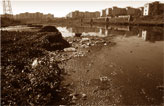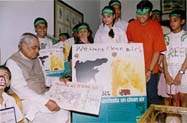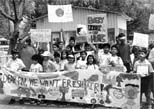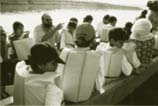
 |
Greening Teachers |
|
 |
In a rare case of role reversal, 22
teachers became students during the Teachers' Workshop in Jaipur organized by CSE and
INTACH, on August 23 and 24.
The workshop saw civics, geography, science, English, biology and history teachers
exploring ways to integrate environment and cultural heritage in regular school
curriculum. |
|
The Environment Education
Unit of CSE conceived the workshop after numerous requests from teachers asking for
training materials and ideas for integrating environment in regular school curriculum.
Recognising that school teachers play an irreplaceable role in any environment education
effort, INTACH, through its Virasat (heritage) programme partnered with CSE in involving
several schools in Jaipur. |
|
 |
A summer cruise on Kalapaani! |
|
 |
Summer Hols and nothing to do! Enter Gobar
Times in the Bharat Petroleum Housing Complex in Sector 56, NOIDA. And then there was
plenty to do.
It started off (as usual) with our friendly cow, your city, in the complex. A mock
newspaper was produced with everyone pitching in. The people digging the 'round holes' in
the ground for rainwater harvesting were interviewed, the officer-in-charge, was
interviewed, housewives in the flats were queried on their waste habits, Ads were drawn
and finally |
|
| you had the mock times ready. This was just
the beginning. The next day on, the kids had to work on the real thing. |
|
|
|
 |
It might have been hot and humid in Varanasi but not for
the 40 students from classes 6 to 12 who participated in the Gobar Times media workshop
here. The Gobar Times team from CSE was helped in this by a local cultural organisation,
Jnana Pravaha.
After an initial training on investigative reporting, photography, editing and designing,
the students from four schools (Rajghat Besant, W H Smith, St. John's, Sunbeam Bhagwanpur)
of Banaras were let loose. |
After the collection of reports was over,
the editors, illustrators and designers got down to work.
And finally, the Gobar Times Varanasi edition was released (a computer printout because
the local printers just could not take in the fact that a newspaper could be printed in a
day!). The students had been brilliant with their work and the GT says it all! |
|
|
 |
Rediscovery of Jaipur |
|
 |
Take twenty-two 13-year-olds into the pink walled city,
let them investigate and click, introduce them to the chief minister and the mayor, and
voila, you have a great new issue of Gobar Times ready!!
|
| The environment education team of CSE joined
hands with the Jaipur chapter of INTACH to organise a media workshop for schools students
of Jaipur from February 6 to 8. Students from classes VI to VIII of five schools (St.
Xavier's, Sawai Man Singh, Maharani Gayatri Devi, Holly Hocks and Mahavir) became
investigative reporters, photographers, editors and designers, or rather, were trained on
those lines during the three-day workshop. . |
|
|
|
|
 |
Boat ride over the Yamuna! One would
think it inspires poetry and art. No it does not. The children of Father Agnel School,
Gautam Nagar, will tell you better. They went there on a Sunny Tuesday, the 17th of
October. A group of 40 students from class five and six went to the hind boat club at
civil lines and rowed up to Gandhi Nagar. |
|
| They
saw carcasses in the water of the Yamuna, children picking polybags from the river,
children diving to the bottom of the river to pull out a coin or two thrown in the river
along with other things in rituals and poojas. They tested the physical parameters of
water and reported the observations in a form, each child was given. The yamuna-yuk poster
was informative. |
|
|
|
 |
The 29th of September,
2001, found the Springdalians assembled in school for a workshop on environment. A basic
introduction to environment followed by a session to address the issue of water. The
children played a modified web-of-life game touching upon various environment components.
How does a cotton shirt affect a polar bear in the arctic? What has my car got to do with
a refugee in Bangladesh? What does a flush in the morning have to do with pollution of the
Yamuna? |
|
This
was followed by an introduction to the concept of "ecological footprint".How big
is your ecological footprint? The ecological footprint of a city, a country and so
on…..
The water component included water conservation, water pollution and management. It was
introduced to the students through presentations on traditional, rural and urban |
|
|
|
 |
This development education project has an initiation
meeting with school representatives on August 18, 2001
Seven NGOs working on developmental education have got together to form Beyond Zebra, a
pioneer project, which works with principals, teachers and students, to form youth leaders
and provide them with life skills and citizenship education. |
Apart from Centre for Science and
Environment, the other NGOs are Aashray Adhikar Abhiyan, Butterflies, Development
Alternatives, Pravah, Toxics Link and Shristi, and Youthreach.
On August 18, 2001, there was an initiation meeting between the members of Beyond Zebra
and principals of schools in the Habitat Centre, Delhi. Thirteen schools had participated,
including the British School, Balwant Rai Mehta Vidya Bhavan, Mater Dei School, Vasant
Valley School, Kendriya Vidyalaya, Andrews Ganj, Ramjas School, RK Puram, Apeejay School,
Sheikh Sarai, St Mary's School, Springdales School, Dhaula Kuan, St. Thomas School, Delhi
Police Public School, Navyug School, Peshwa Road, Navyug School, Tilak Marg |
|
|
|
|
 |
A group of students from classes 6th
to 10th from Salwan Public School afternoon shift went on the CSE water walk eco-tour on
July 28, 2001, accompanied by their teacher, Premlata. After a slide show on water
harvesting and water management in ancient India, water harvesting and revival of johads
in Alwar, was discussed. |
|
Children
were introduced to new words like spillway, catchment etc. and issues and politics of the
issues. This was followed by a visit to the ancient baolis or step-wells in Mehrauli. The
maze in the Sukhi baoli was fun for the children and teacher. It is a pity they
could not see Hauz-e-shamsi for lack of time. |
|
|
|
 |
On July 9, 2001, a group of 13
teachers from Chicago attended a presentation at CSE. The presentation was on sustainable
development, poverty, population and whether numbers affect us as much as consumption, and
air pollution.
|
|
They were in India on a
familiarisation visit organised by Katha, on the request of the University of Chicago.
Majority of the teachers in this group teach Social Sciences, with some teaching subjects
like Comparative Literature, World Religions and English. This visit to India was hosted
with the specific purposes of visiting and learning about educational institutions in
India; working with teachers during and after the trip in creating platforms to support
curriculum development in India. And finally a general introduction to India, its culture
through sharing the experiences of not-for-profit organizations. |
|
 |
Launch of G:NET |
|
 |
The Environment Education Unit at the
Centre for Science and Environment launched the Gobar Times Environmental Educators'
Network (G:Net) with the inaugural issue of G:NET in June, 2001. Anyone, be it a teacher,
an educationist, a parent or an interested individual, can become a member of this
network.A member will get a free bimonthly newsletter with facts about current
environmental news, classroom activities and worksheets connected with that issue,
curriculum connect to show how that issue can be incorporated into the different subjects
and so on. A member would also avail other benefits to environment education, like
being invited to CSE events across the country, an electronic news bulletin and 10%
discount on all CSE publications. |
|
|
 |
Clean Air Campaign |
|
 |
At the Auto Expo 2000, a team of
enthusiastic student reporters produced a special edition of Gobar Times which focused on
increasing population of vehicles on Delhi roads and the resulting air pollution due to
vehicular emissions. They spoke to various automobile manufacturers, officials of Society
of Indian Automobile Manufacturers (SIAM) and consumers on the issue of air pollution.
They also interviewed the Chief Minister of Delhi, Ms Sheila Dikshit, on what her
government is doing to curb the menace of air pollution. |
|
|
 |
Earth Day 2000: Children's Cycle Rally |
|
 |
A cycle rally of hundreds of school
children from Delhi culminated at the Prime Minister's Residence on Earth Day. They
highlighted the issue of air pollution in Indian and appealed to the government and the
automobile manufacturers to show genuine concern and take effective action to protect
their health. Children could be seen cycling enthusiastically, carrying placards and
raising their demand for clean air. |
|
|
 |
Manifesto on Clean Air to the Prime Minister of
India |
|
 |
On behalf of all the children of
India, a delegation of 22 children presented the Hon'ble Prime Minister of India , Shri
Atal Bihari Vajpayee, a Children's Manifesto on Clean Air , a part of CSE's Right to Clean
Air Campaign. They drew the attention of government and the automobile manufacturers to
the serious issue of deteriorating air quality in towns and cities of India. This
children's Manifesto was based on contributions, text and drawings, sent by children
across India - as a part of many Earth Day events organised by numerous organisations in
other parts of the country. |
|
|
 |
Environmental Education Workshop on Earth Day
2000 |
|
To commemorate Earth Day, a two-day
workshop on Environment Education was conducted on April 21-22, 2000. 27 educators from 18
institutions - schools and NGOs across the country attended the workshop and the Earth Day
activities. The workshop was organised at India Habitat Centre, New Delhi. The focus was
on "Sustainable Cities" and "replicating the Ecological Footprint Project
in your city or town". |
|
|
 |
Launch of the Ecological Footprint Project
Ecotours |
|
 |
The Ecological Footprint Project was
initiated in May 1998 with the Yamuna Yuk-Ride which took fifty school children from 12
schools on a boat ride down the Yamuna accompanied by experts from CSE, CPCB and
Development Alternatives. The students were provided with cameras to photograph their
experiences on the ride. The Ecological Footprint Project plans to address the lack of
perspective of students towards their city's environment and the symbiotic relationship
that exists between a city and its inhabitants. The neglect and degradation of our rivers,
and especially the Yamuna, in Delhi's context, seemed like a good place to start. And so
the Yamuna it was. |
|
Later in the day, at the
IHC office, some of the children prepared a special edition of Gobar Times with the help
of professionals from the field of journalism and editorial design closely supervising,
while others prepared a colourful photograph and painting exhibition based on their
experiences. Young students trained by the Delhi Environment Action Network (DEAN)
demonstrated how to test the water quality of the samples collected on the boat-ride.
Besides getting to know about the Yamuna, the exercise aimed to give the
student-investigators hands-on experience in these professions. |
|
|